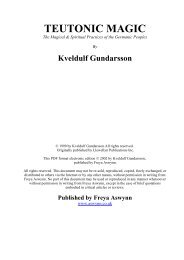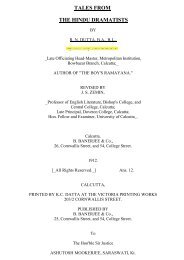Untitled - Awaken Video
Untitled - Awaken Video
Untitled - Awaken Video
Create successful ePaper yourself
Turn your PDF publications into a flip-book with our unique Google optimized e-Paper software.
Chapter 6. The Sky 150<br />
concept. Gifts from the Gods were not necessarily “rewards” for good deeds done<br />
or for being on one’s best behavior. To understand the concept, one would do well<br />
to look at how kings treated their retainers. Kings gifted their men for a variety<br />
of reasons. A successful raid, for example, meant a surplus of wealth within a<br />
community which needed to be “shared.” A common kenning, or poetic metaphor,<br />
for a king or war-leader in this circumstance was “gold-hater,” i.e., “someone who<br />
does not value gold except that it makes a good gift to someone else.” Gold was<br />
also gifted to a man for a poem well turned, for a song well sung, for a joke well<br />
played, for a battle well fought, or simply for friendship’s sake. The intertwining of<br />
luck/ power is of greatest importance here. 11<br />
Interaction between lineages, as stated in Chapter 2, is the very foundation of<br />
all relationships in the early Germanic way of thinking, and the interaction between<br />
the lineages of Gods and people was no different. The Gods had long and powerful<br />
lineages which reached far back to the beginning of time and which connected them<br />
to all lands within the World Tree; therefore, They had access to true knowledge.<br />
Mankind, on the other hand, was very limited in its access to knowledge, but because<br />
of its ability to engage in action which could effectively alter the state of the Waters<br />
flowing out of the Well of Urð at any given point in time, it had access to a power, i.e.<br />
¸orlög, which the Gods needed. As a team of sorts, the combination of the lineages of<br />
Gods and of mankind, i.e. of knowledge with action, the entire Tree benefits. This<br />
relationship between deities and mankind is the exact reflection of that between a<br />
king and his retainers, a war-leader and his warriors, or, ideally, a peasant farmer<br />
and his bondsmen. This is also the relationship stressed throughout the Hávamál:<br />
and<br />
“Give your friends gifts– they’re as glad as you are<br />
to wear new clothes and weapons<br />
frequent giving makes friendships last<br />
if the exchange is equal.” (st. 41)<br />
“If you have a friend you feel you can trust<br />
and you want him to treat you well<br />
worldview presented here, "gift-giving" was important because that was one of the ways that<br />
lineages could be crossed or intertwined. Gift-giving by a king to a retainer or by a God to a man<br />
was done out of a "need" on the part of the giver, a "need" whereby the giver is able to participate<br />
in the ørlög of the receiver. Gift-giving, then, is a matter of power/ luck as opposed to the simple<br />
moving of a material object from one person to another.<br />
11 Sturluson, Snorri The Prose Edda, translated by Anthony Faulkes, (Everyman’s Library;<br />
London, UK) 1987, p. 114.
















